If you’re just joining The Golden Bowl, welcome! This is a space where I reflect on parenting, creativity and personal growth as a creative, children’s book author, and mom of three. These last two weeks have been tumultuous ones in the world, and I have found myself – along with many parents around me – struggling with anxiety and fear. How do we raise children in a world that feels so chaotic and uncertain? As a result, I thought it might be helpful to spend some time reflecting deeply on how parents and teachers can stay grounded, stable, and connected during global crises.
Audio version:
Carpe Diem
During World War II, Winston Churchill famously employed red stickers marked “Action This Day,” translated from the Latin “Carpe Diem,” to mark his most important memos. Churchill’s courage and clarity stand out as hallmarks of great leadership. With chaos today echoing that of the 1920s - 1940s, we can all benefit from reflecting on what it means to be a good leader.
Dr. Becky Kennedy has famously asserted that a good parent is a “sturdy leader” who knows that we are all “good inside.” A parent’s job is to teach their children how to transcend their lizard brains (fear-based, me-focused) and to thrive physically, intellectually, emotionally, and spiritually both as individuals and in community (love-based, we-focused).Unfortunately, during times of global crisis, it is all too easy to fall back on the lizard brain’s survival behaviors. A good summary of these behaviors comes from The Mosaic Project, a non-profit that teaches children to be leaders and peacemakers, in the form of the Three Peace Blockers:
The Three Peace Blockers
Blame: “It’s all THEIR fault” – we give away agency and let others determine our self-worth
Guilt: “It’s all MY fault” – inner collapse and self-blame; self-betrayal is the ultimate betrayal
Defensiveness: “It’s NOT my responsibility” – denies both interconnectedness and individual responsibility
According to the Mosaic Project, the antidote to these three patterns of behavior are the Three Keys to Peace:
The Three Keys to Peace
Listening: Paying close attention, and expanding one’s perspective beyond dualistic thinking, accepting that multiple things can be true at the same time.
Empathy: Opening your heart to others. You can be empathetic without agreeing or taking responsibility for others’ feelings or suffering.
Assertive Communication: Communicating with “Embodied I-Statements” – in which your words, body, energy, and feelings are all in alignment.
When the outside world brings turbulent news, we can ground ourselves in the Three Keys to Peace, and orient ourselves to our inner knowing. The Serenity Prayer is a good summation of this inner orientation:
God grant me the serenity to accept the things I cannot change, the courage to change the things I can, and the wisdom to know the difference.
Beyond Survival: Becoming Wise Elders
Historically, children are a source of inspiration and motivation to the world around them. However, well-meaning, anxious adults often project too much power onto children, when they are for the most part powerless — while abdicating some of our own. When we pass powerlessness and anxiety to them, today’s children become tomorrow’s anxious and disempowered adults. If the purpose of education is to help children become wise elders, as author Vanessa Ochado de Olivera argues, adults must first become wise elders themselves.
So how do we parent with sturdiness and love through a global crisis? It starts with taking care of ourselves. Here are a ten ideas that have helped me stay steady as a parent:
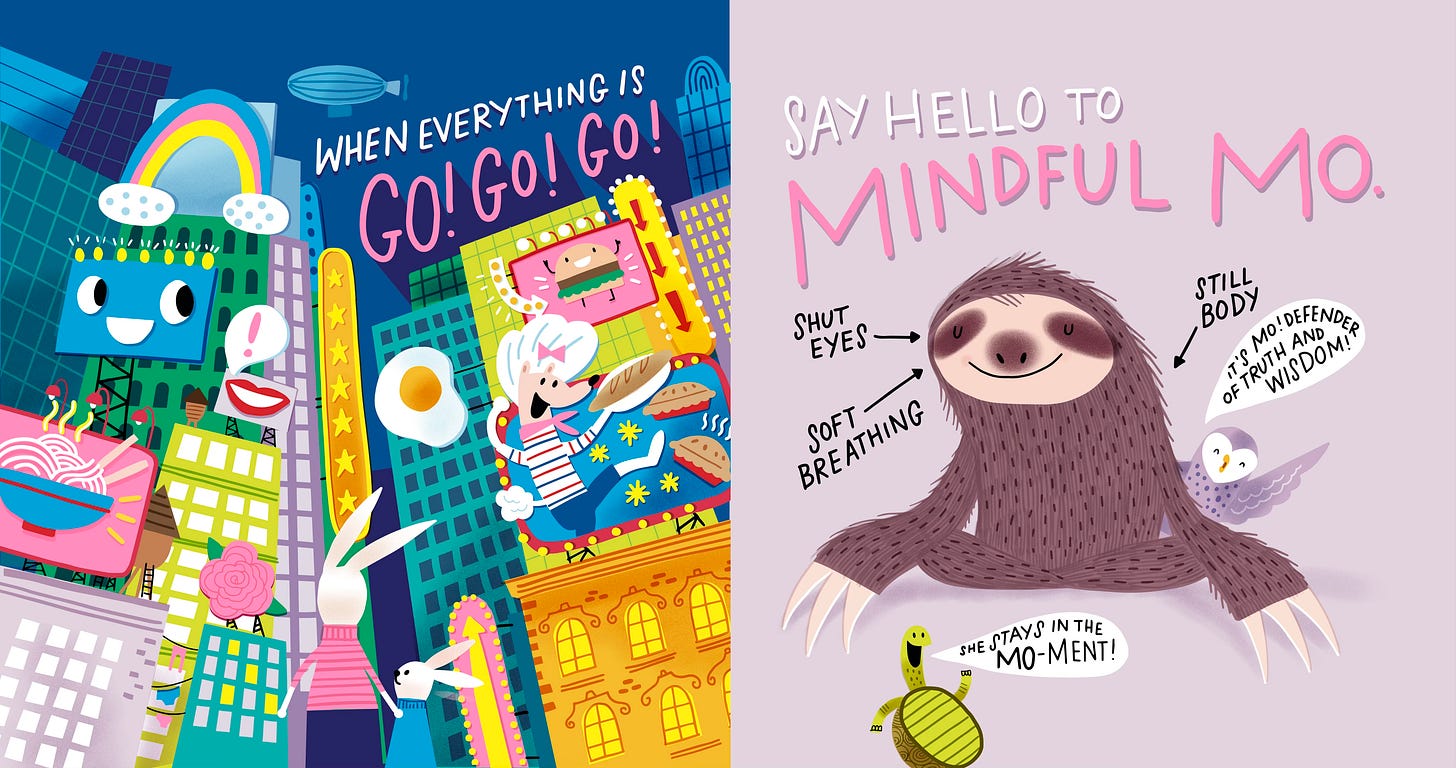
Energy follows attention.
Your attention is your most precious resource. Focus it on your heart (self-compassion) and being present. Avoid allowing your attention to go to fear, negativity and things that are beyond your control, especially when you are tired or underresourced. When you are well-resourced and feeling centered, do tune in to trusted, evidence-based, and wise news sources to stay informed — for example about the impact of tariffs or House’s bill to curtail voting rights — so you can make decisions that keep your family safe and healthy. Recognize that a lot of what appears in the news is fear-based projection.Reinforce positive behavior.
Parenting wisdom tells us that when a toddler is having a tantrum, it is best to ignore the behavior. Instead, we praise positive behavior by ‘catching kids in the act’ of doing something right. The same goes for events in the world around us: the more we give attention to fear and negativity, the more we encourage those patterns in the collective.Go inside for answers.
When you feel anxious, go within. What is right for you, not just now, but up and down your timeline (how will you feel next month if you make this choice today?)? What do you need to move forward (help? information? a boundary?). There is an unshakable core of self-worth and inner knowing within each of us, which can be felt in the solar plexus, and up and down the spine. Inner knowing is a felt sense, not analysis. Rather than looking outside for answers, go inside to find out what is right for you.

Life is a spiritual school.
We can embrace life as a spiritual school by looking for spiritual, ethical, and intellectual lessons in the day’s events. Every painful event in our outer world holds up a mirror to the inner areas where we need to grow spiritually. Sometimes this means moving towards pain, rather than away from it. The difference between pain and suffering is that suffering is a story we tell about pain. Feel the pain, but then move back into presence and love.Humans are here to serve.
Just as Galileo proved that the Sun doesn’t revolve around the Earth, global crises show us that the Earth doesn’t exist to serve humans - it’s the other way around. Living in fear, greed, separation, and violence is a form of abandoning our true nature. Times of crisis are times to heal, love, and grow.
We cannot control the outer world, but we can influence it.
Global crises are collective. No one is individually to blame, and no one can individually fix it. Part of living in an interconnected world with peace and equanimity is to accept and bear witness to pain, taking appropriate actions to remain calm and centered. To the extent that we do influence the outer world, we do it first and foremost through the quality of our presence and lovingkindness.What is yours to do?
Porous boundaries keep us in crisis. They can also lead us into righteous certainty, on the one hand, and anxious uncertainty, on the other. Understand what is yours to do, and only do what is yours. Put your attention on your heart center and breath, feel energy coming up from the ground to support you, and notice your energetic boundary. The first job that is always yours to do is to be in presence. Beyond that, you can take small meaningful actions that are right for you, such as: doing your work, taking care of your body, having a spiritual or creative practice, spending time in nature, educating yourself, spending quality time with friends and family, volunteering, listening to music or dancing, reading books and poetry, etc.
The soul is infinite.
Global crises can bring us face-to-face with the fear of losing everything, which inevitably includes fear of death. When we come to peace with death and dying, the prospect of losing a job, home, savings, or freedom becomes less terrifying (though no less painful and thus deserving of compassion). World spiritual traditions teach us that the soul persists beyond the physical body. Even if it cannot be scientifically proven yet, there is comfort in embracing this possibility.Trust.
Trust that everything is as it should be for our collective growth and learning. I prefer not to hope, which carries the subtle valence of fear, but instead to trust. Connect with Earth (ground and body) and with Love (heart and spirit)– the two true sources of power – and stay connected as much as you can. Never lose trust. The mere fact that you are alive shows that your presence is needed. You are “incredible, brilliant, one-of-a-kind, the only YOU we’ll ever find!”
Be a peacemaker.
Peacemaking is both active and receptive. It listens to all perspectives, and asserts the values of love, open-mindedness, mutual respect, individuality, community, and interconnectedness. Assert these values whenever you are in community with others. Practice the Three Keys to Peace and stay aware of the Three Peace Blockers. Have an open mind, a grateful heart, and strong boundaries.
When the world is hard to love, love it harder
When global leaders appear to be letting us down, a strong leader steps up. No one can hurt you if you refuse to hurt yourself. The answer to any perceived attack or betrayal is to love yourself and those around you, especially children. When the world is hard to love, love it harder.
In her podcast, Wild, author Sarah Wilson always asks her guests, “what is left after you have lost everything?” One of the most common answers is “Love.” Children intuitively see and know this in their bright, playful energy. This is the spark that my sister Eunice and I seek to amplify in our books. We trust that the parents, teachers, and leaders who read our books will be strong, joyful, and present with children, so that they can be grow up to be sturdy leaders, too, and help make this world more beautiful. Carpe diem!

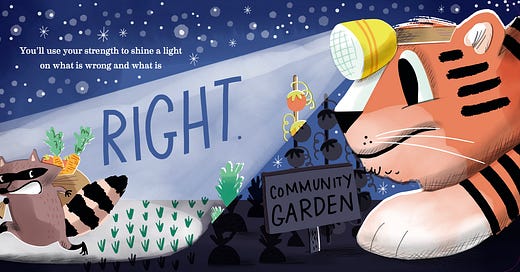






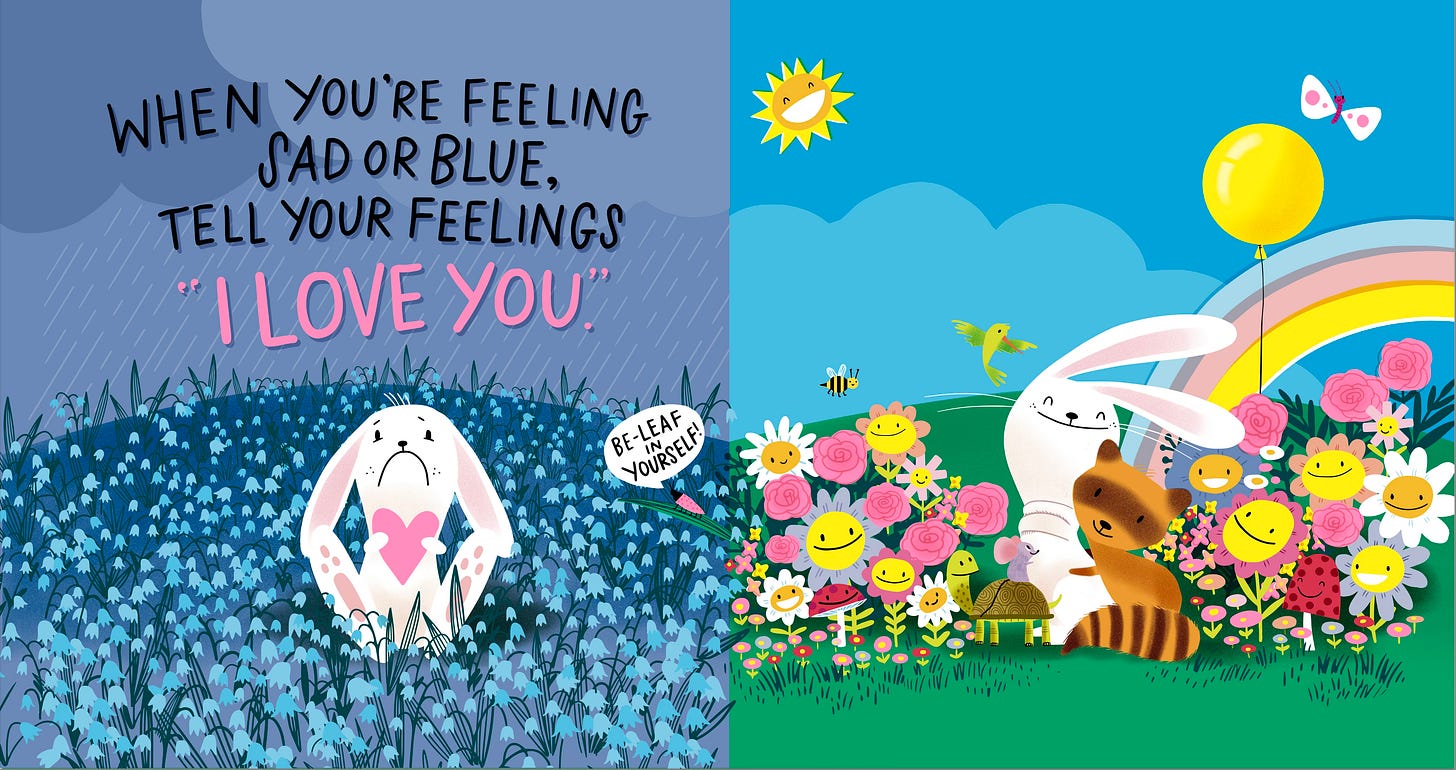
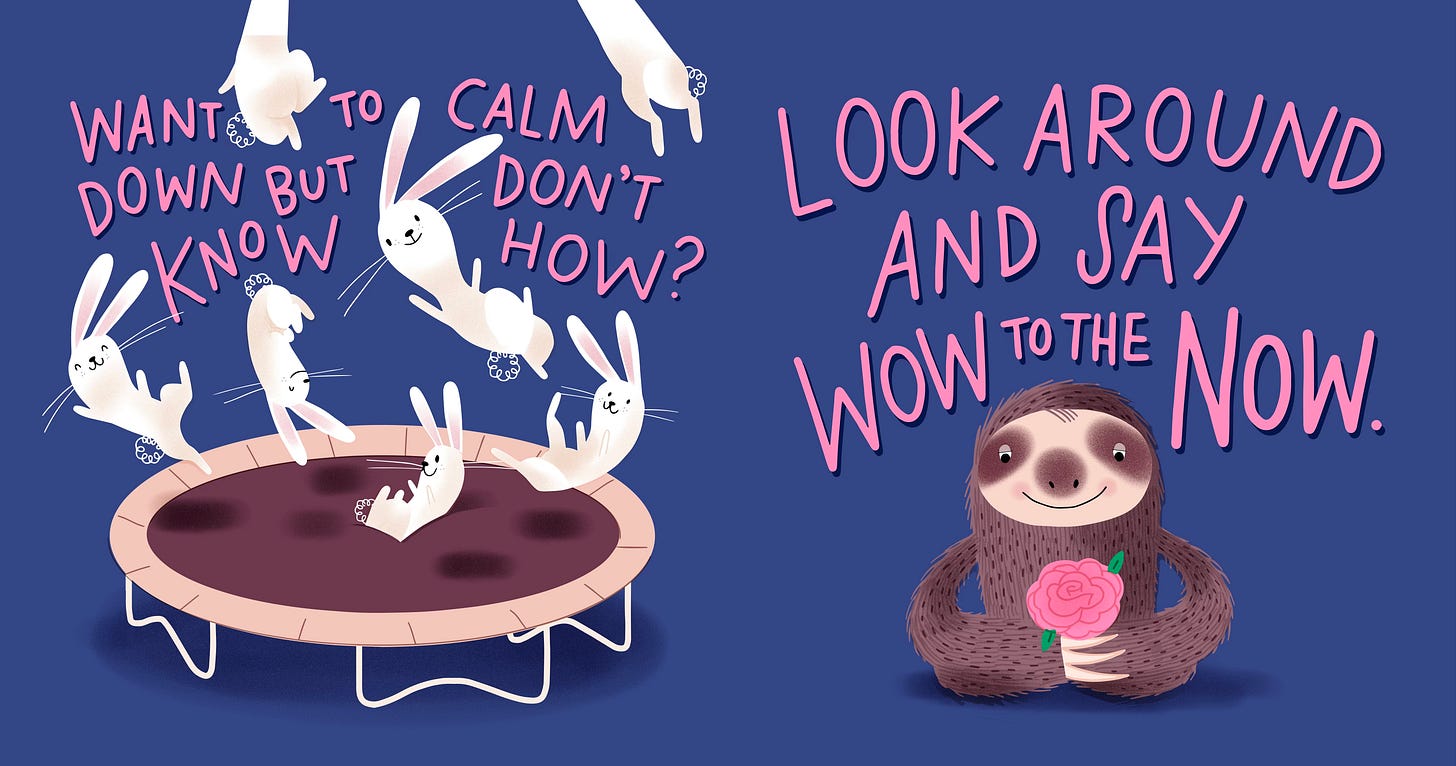

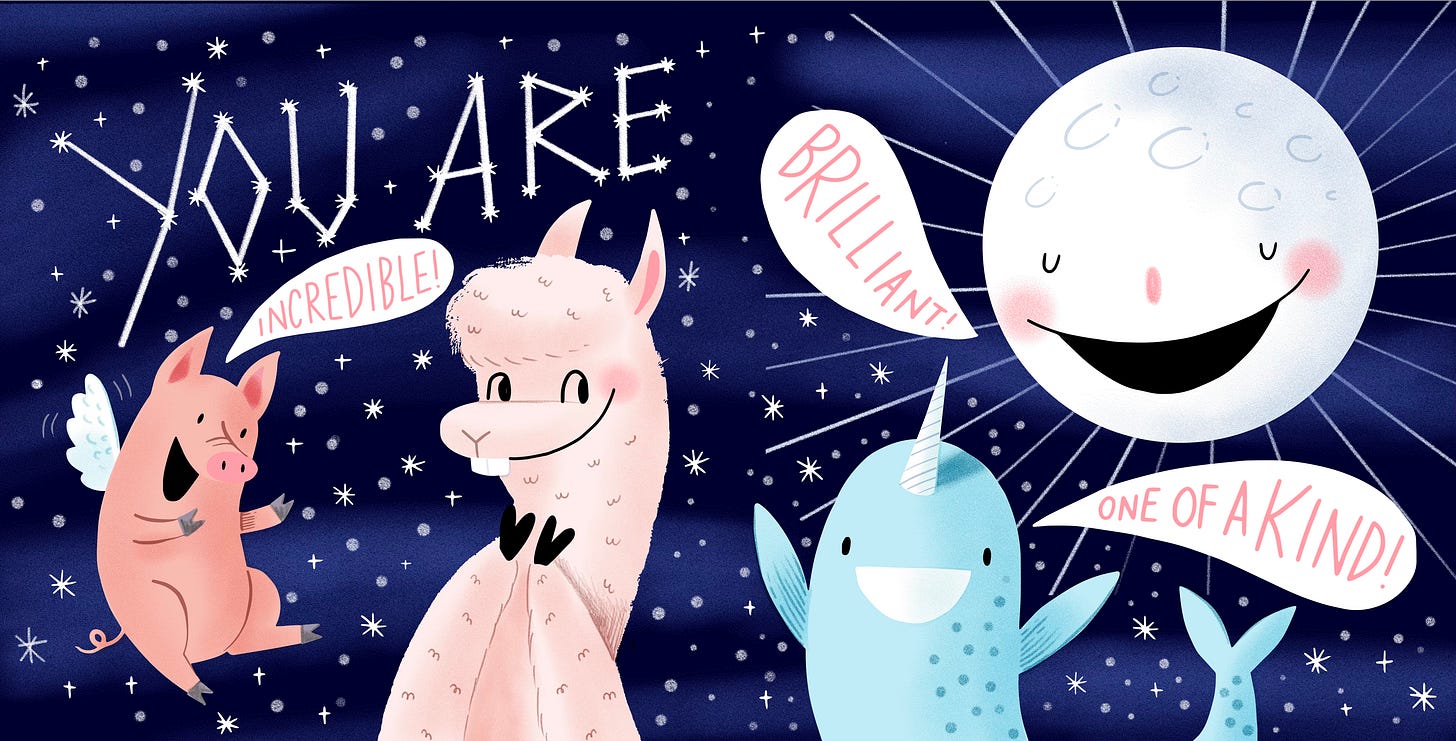

Sabrina, what a beautiful and much-needed reminder about staying grounded—complete with gorgeous illustrations from your and Eunice's books. Thank you!
Fantastic guidance! Thank you, Sabrina.